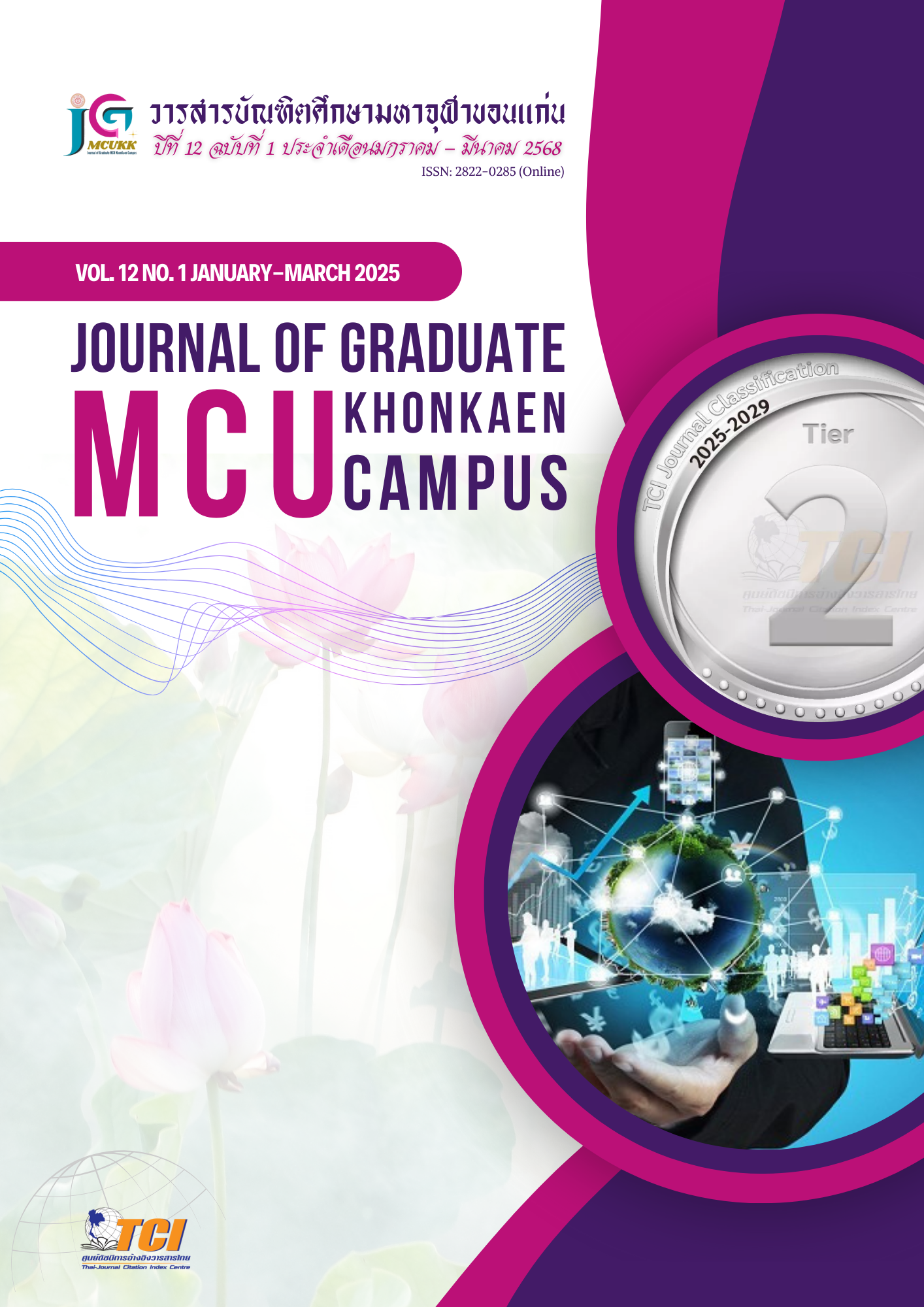การศึกษาความต้องการจำเป็นในการออกแบบและพัฒนาบอร์ดเกมการศึกษา เพื่อส่งเสริมสมรรถนะทางวิทยาศาสตร์สิ่งแวดล้อม สำหรับนักเรียนชั้นประถมศึกษาตอนต้น กลุ่มเครือข่ายเมืองสามอ่าง สังกัดสำนักงานเขตพื้นที่การศึกษาประถมศึกษากาฬสินธุ์ เขต 3
Main Article Content
บทคัดย่อ
การวิจัยนี้มีวัตถุประสงค์เพื่อศึกษาความต้องการจำเป็นในการออกแบบและพัฒนาบอร์ดเกมการศึกษาเพื่อส่งเสริมสมรรถนะทางวิทยาศาสตร์สิ่งแวดล้อมสำหรับนักเรียนระดับประถมศึกษาตอนต้นในกลุ่มเครือข่ายเมืองสามอ่าง จังหวัดกาฬสินธุ์ การดำเนินการวิจัยอยู่ในระยะที่ 1 ซึ่งมุ่งเน้นการวิเคราะห์ปัญหาและสำรวจมุมมองของผู้มีส่วนได้ส่วนเสีย กลุ่มเป้าหมายประกอบด้วยครูผู้สอนวิชาวิทยาศาสตร์และเทคโนโลยีที่สอนในระดับชั้นประถมศึกษาตอนต้น จำนวน 48 คน นักเรียนระดับชั้นประถมศึกษาตอนต้นจำนวน 440 คน ผู้อำนวยการโรงเรียนในกลุ่มเครือข่ายเมืองสามอ่าง จำนวน 16 คน ศึกษานิเทศก์ สังกัดสำนักงานเขตพื้นที่การศึกษาประถมศึกษากาฬสินธุ์ เขต 3 จำนวน 3 คน และนายอำเภอห้วยผึ้ง จำนวน 1 คน วิธีการวิจัยใช้แนวทางการออกแบบทางการศึกษาของ McKenney และ Reeves (2012)
โดยรวบรวมข้อมูลผ่านแบบสัมภาษณ์กึ่งโครงสร้างแบบสอบถาม และการสังเกตการณ์
ผลการวิจัย พบว่า
ครูขาดแคลนสื่อการเรียนการสอนที่เหมาะสมกับบริบทของโรงเรียน นักเรียนสนใจการเรียนรู้ผ่านเกมที่มีการแข่งขันและสามารถเชื่อมโยงกับชีวิตจริง ข้อมูลจากการสัมภาษณ์ดังกล่าวจะนำไปสู่แนวทางการออกแบบบอร์ดเกมที่ตอบสนองความต้องการของผู้เรียน มีสีสันสดใส ส่งเสริมการมีส่วนร่วม และสามารถสร้างจิตสำนึกด้านสิ่งแวดล้อม
Article Details

อนุญาตภายใต้เงื่อนไข Creative Commons Attribution-NonCommercial-NoDerivatives 4.0 International License.
เอกสารอ้างอิง
สุวิมล ว่องวาณิช. (2563). การวิจัยการออกแบบทางการศึกษา. สำนักพิมพ์จุฬาลงกรณ์มหาวิทยาลัย.
สำนักงานคณะกรรมการการศึกษาขั้นพื้นฐาน. (2560). ตัวชี้วัดและสาระการเรียนรู้แกนกลาง กลุ่มสาระการเรียนรู้วิทยาศาสตร์ (ฉบับปรับปรุง พ.ศ.2560) ตามหลักสูตรแกนกลางการศึกษาขั้นพื้นฐาน พุทธศักราช 2551. โรงพิมพ์ชุมนุมสหกรณ์การเกษตรแห่งประเทศไทย จำกัด.
อภิสิทธิ์ไล่ ศัตรูไกล. (2557). SERVICE DESIGN WORKBOOK คู่มือการออกแบบบริการ. ศูนย์สร้างสรรค์งานออกแบบ.
Ardoin, N. M., Clark, C., & Kelsey, E. (2018). Environmental education: A systematic review and future perspectives. Environmental Research Letters, 13(6), 063002.
SDG Move. (2022, June 2). สาระสำคัญจากรายงานการพัฒนาที่ยั่งยืน ปี 2022 (SDR 2022). SDG Move. Retrieved February 28, 2025, from: https://www.sdgmove.com/2022/06/02/press-release-key-messages-sdr-2022-th/
Falk, J. H., & Dierking, L. D. (2000). Learning from museums: Visitor experiences and the making of meaning. AltaMira Press.
IPCC. (2023a). Climate Change 2023: The Physical Science Basis. Cambridge University Press.
IPCC. (2023b). Climate Change 2023: Impacts, Adaptation, and Vulnerability. Cambridge University Press.
Ke, F. (2009). A qualitative meta-analysis of computer games as learning tools. Handbook of research on effective electronic gaming in education, 1, 1-32. https://doi.org/10.4018/978-1-59904-808-6.ch001
McKenney, S., & Reeves, T. (2018). Conducting educational design research. Routledge.
Mummalaneni, V., & Sivakumar, S. (2008). Effectiveness of a board game in fostering a customer relationship orientation among business students. Journal of Relation ship Marketing, 7(3), 257–273. https://doi.org/10.1080/15332660802409613
OECD. (2023). PISA 2025 Science Framework. Retrieved from https://pisa-framework.oecd.org/science-2025
Plass, J. L., Homer, B. D., & Kinzer, C. K. (2015). Foundations of game-based learning. Educational Psychologist, 50(4), 258-283. https://doi.org/10.1080/00461520.2015.1122533
Spitzer, M. W., & Fraser, B. J. (2020). Impact of game-based learning on environmental literacy. Journal of Science Education and Technology, 29(4), 289-305.
Trigwell, K., Prosser, M., & Waterhouse, F. (2013). Relations between teachers' approaches to teaching and students' approaches to learning. Higher Education, 39(3), 269-286. https://doi.org/10.1023/A:1003925830711
Wouters, P., Van Nimwegen, C., Van Oostendorp, H., & Van Der Spek, E. D. (2013). A meta-analysis of the cognitive and motivational effects of serious games. Journal of Educational Psychology, 105(2), 249-265. https://doi.org/10.1037/a0031311

